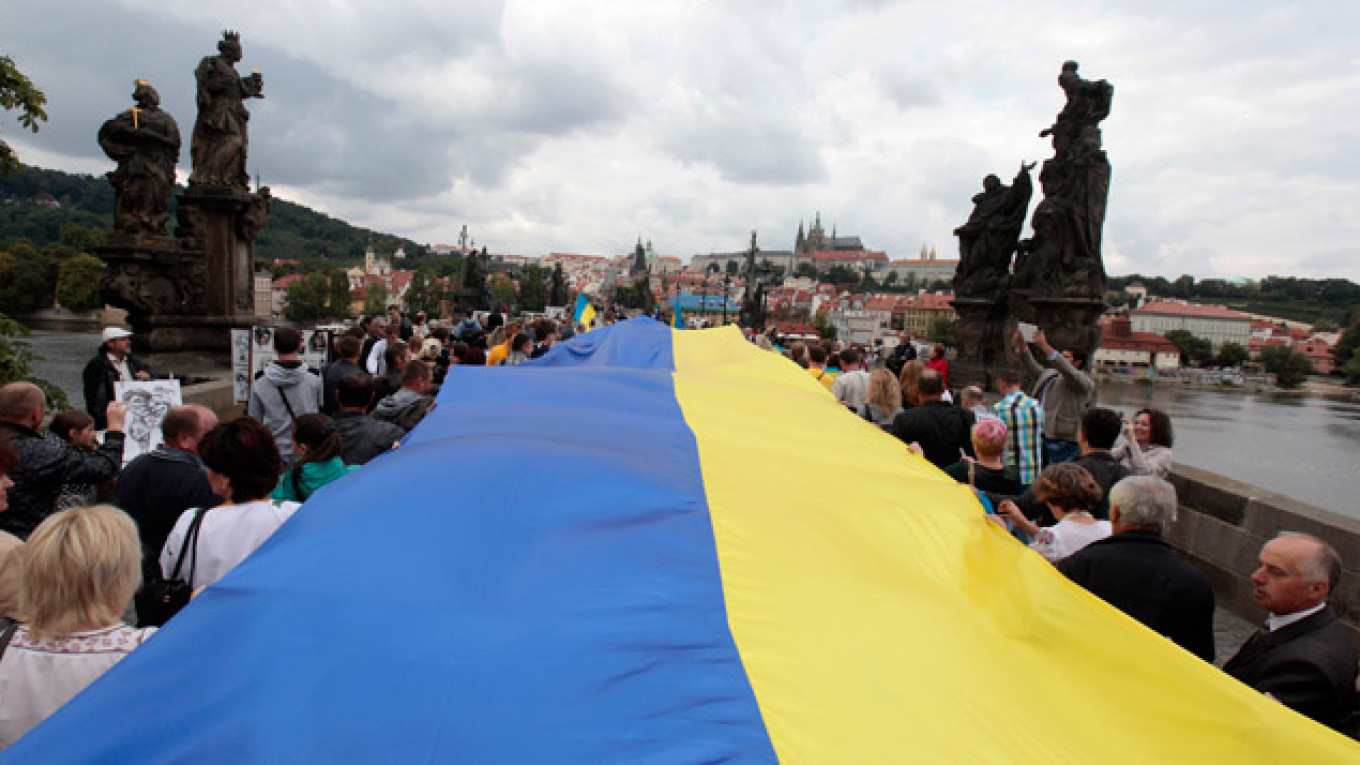The colors of the Ukrainian flag have become terribly "offensive" in Russia — wearing them, painting them, or even tweeting them practically turns you into a walking target.
When Ukrainian daredevil Mustang Wanted painted the top star of a Stalin-era skyscraper in yellow and blue — and planted a Ukrainian flag on top of it for good measure — I was struck by the consternation and even fear displayed by some Moscow residents.
"It's terrorism, plain and simple," a middle-aged neighbor told me, as if Mustang's stunt was somehow comparable to, say, the Moscow metro bombings of 2010, or as if the flag that briefly flew up there belonged to ISIS.
When people started getting arrested all over the place for blue-and-yellow displays — when, say, a poet was hauled to the police station in St. Petersburg for a terrifyingly Ukrainian-looking baseball cap — I found myself both worried and amused. How far was this all going to go?
In 2006, for example, I cheered for Ukraine in the World Cup. Pictures of me wearing the flag are still out there on the Internet, so does that mean I also am a bloodthirsty "terrorist" now?
Following the annexation of Crimea, sanctions, daily rounds of heavy-handed television propaganda, and accusations of Russia's involvement in a murky shadow war in eastern Ukraine, it makes sense for the Ukrainian flag to evoke feelings of defensiveness and anger in Russians.
But there are also other, more complicated reasons as to why the Ukrainian flag in particular is such an irritant.
After all, Russians should be laughing hysterically at displays of the Ukrainian flag. Moscow has managed to destabilize the so-called "junta" in Kiev without declaring war. And while sanctions may seriously hurt the Russian economy down the line, that realization does not appear to have sunk in yet. Putin's rating is astronomically high. The euphoria of taking Crimea has certainly not worn off yet.
Instead of laughing, Russians are panicking at the merest hints of support for Ukraine on their soil. It is a sign of a greater ideological and psychological struggle that is happening below the surface in Russian society.
Putin's tremendous approval rating and various opinion polls on Ukraine have been cited as a sign that Russians are completely deluded, lulled into a state of complacency by triumphalist television programs, unable to grapple with the potential consequences of the conflict over Ukraine.
Yet it has repeatedly been pointed out that reality is more complicated than that. Schooled by the years of the Stalinist Terror, modern Russians are extremely good at telling pollsters — and, by extension, the authorities — exactly what they want to hear.
But more importantly, the anger at displays of Ukrainian flag colors is symptomatic of a deeper insecurity — both with regard to the present situation and Russia's future.
The majority of Russians do not hold their government responsible for the destabilization of Ukraine, pointing at the West as the real culprit. Yet these same people also understand that Ukraine's incredibly quick descent into violence is a scenario that is equally possible in Russia, a country with far more inter-ethnic tensions than Ukraine and with a long history of political turmoil.
Putin's approval rating is yet another piece of the psychological puzzle. Russians, you see, couldn't care less about the notion that the toppling of former Ukrainian President Viktor Yanukovych is perceived by millions of Ukrainians as a win over the forces of darkness and a chance for EU integration.
What Russians see instead is a neighboring country in freefall ever since its leader was ousted. Ukraine, to them, is the classic example of how it is better to stick to the devil you know. And for all the complexities of life in Russia, the average Russian is used to living better than the average Ukrainian — hence the average Russian feels that there is automatically more to lose from sudden regime change.
Ultimately, Ukraine's cheerfully pastoral flag, depicting blue skies and golden fields, might as well look like a landscape painting of a barren wasteland as far as the majority of Russians are concerned.
Underneath the bravado in Russia, the rallying cry of "Crimea is ours!", lies the understanding that when things go wrong, they go wrong quickly.
Natalia Antonova is an American playwright and journalist.
A Message from The Moscow Times:
Dear readers,
We are facing unprecedented challenges. Russia's Prosecutor General's Office has designated The Moscow Times as an "undesirable" organization, criminalizing our work and putting our staff at risk of prosecution. This follows our earlier unjust labeling as a "foreign agent."
These actions are direct attempts to silence independent journalism in Russia. The authorities claim our work "discredits the decisions of the Russian leadership." We see things differently: we strive to provide accurate, unbiased reporting on Russia.
We, the journalists of The Moscow Times, refuse to be silenced. But to continue our work, we need your help.
Your support, no matter how small, makes a world of difference. If you can, please support us monthly starting from just $2. It's quick to set up, and every contribution makes a significant impact.
By supporting The Moscow Times, you're defending open, independent journalism in the face of repression. Thank you for standing with us.
Remind me later.








